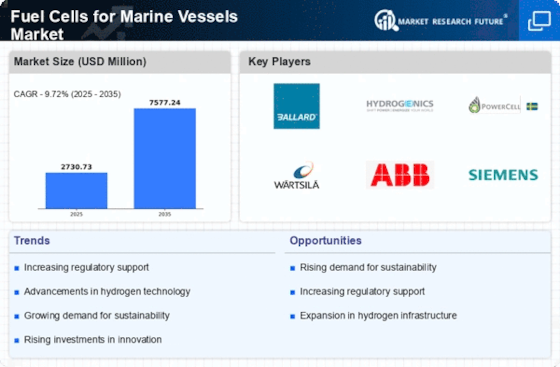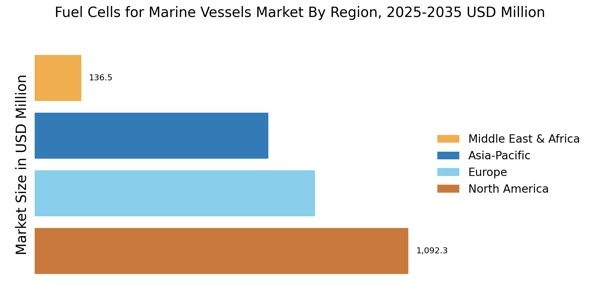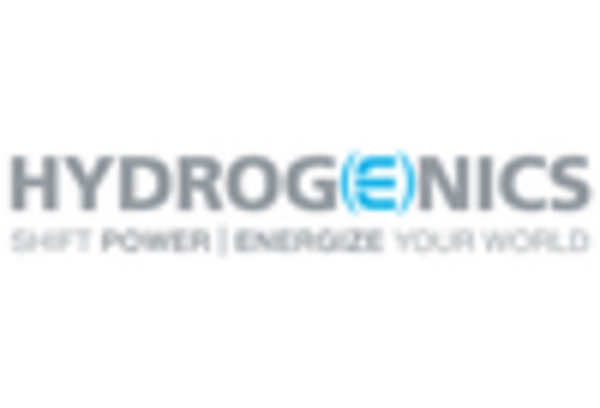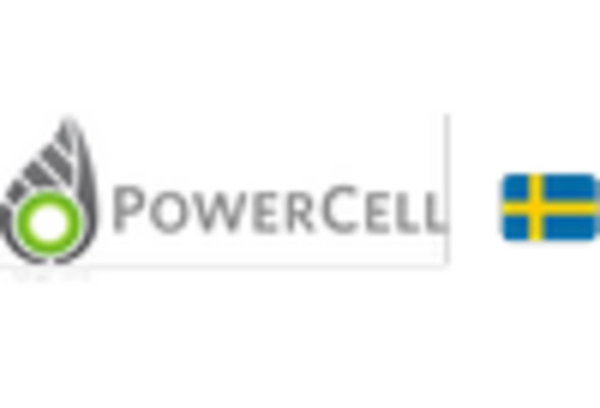Environmental Regulations
The increasing stringency of environmental regulations is a pivotal driver for the Fuel Cells for Marine Vessels Market. Governments are implementing stricter emissions standards to combat climate change and reduce marine pollution. This regulatory landscape compels shipbuilders and operators to seek cleaner alternatives, such as fuel cells, which emit significantly lower levels of greenhouse gases compared to traditional marine fuels. For instance, the International Maritime Organization has set ambitious targets for reducing greenhouse gas emissions from shipping, which could lead to a substantial shift towards fuel cell technology. As a result, the demand for fuel cells in marine applications is likely to rise, as stakeholders strive to comply with these regulations while maintaining operational efficiency.
Technological Innovations
Technological advancements in fuel cell technology are driving the Fuel Cells for Marine Vessels Market forward. Innovations such as improved fuel cell efficiency, enhanced durability, and reduced costs are making fuel cells more viable for marine applications. Recent developments in hydrogen production and storage technologies also contribute to this trend, as they facilitate the integration of fuel cells into existing marine infrastructures. According to recent data, the efficiency of fuel cells has improved by approximately 30% over the past decade, making them a more attractive option for ship operators. These technological breakthroughs not only enhance the performance of fuel cells but also lower the overall lifecycle costs, thereby encouraging wider adoption in the marine sector.
Market Demand for Clean Energy
The growing demand for clean energy solutions is a significant driver for the Fuel Cells for Marine Vessels Market. As stakeholders in the maritime sector increasingly prioritize sustainability, the shift towards renewable energy sources becomes more pronounced. Fuel cells, particularly those powered by hydrogen, offer a promising alternative to conventional fossil fuels, aligning with the industry's goals for decarbonization. Market data indicates that the demand for hydrogen fuel cells in marine applications is projected to grow at a compound annual growth rate of over 20% in the coming years. This trend reflects a broader commitment to reducing the carbon footprint of maritime operations, thereby positioning fuel cells as a key player in the transition to cleaner energy sources.
Economic Incentives and Subsidies
Economic incentives and subsidies provided by governments are significantly influencing the Fuel Cells for Marine Vessels Market. Many countries are offering financial support to encourage the adoption of clean technologies, including fuel cells. These incentives can take various forms, such as tax breaks, grants, and subsidies for research initiatives. Such financial mechanisms lower the barriers to entry for ship operators considering the transition to fuel cells, making it a more attractive option. Recent data indicates that countries with robust subsidy programs have seen a marked increase in the deployment of fuel cell technologies in marine vessels. This trend suggests that economic incentives play a vital role in accelerating the shift towards sustainable maritime solutions.
Investment in Research and Development
Investment in research and development (R&D) is a crucial driver for the Fuel Cells for Marine Vessels Market. Increased funding from both public and private sectors is facilitating the advancement of fuel cell technologies tailored for marine applications. This investment is essential for overcoming existing technical challenges, such as fuel cell efficiency and durability in harsh marine environments. Recent reports suggest that R&D spending in the fuel cell sector has surged, with several governments and corporations committing substantial resources to develop innovative solutions. This focus on R&D not only accelerates technological progress but also fosters collaboration between academia and industry, ultimately enhancing the competitiveness of fuel cells in the marine market.

















